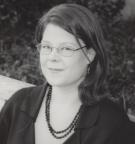Emily D. Johnson

Education: BA in Russian Civilization from UCLA; Harriman Certifcate and PhD in Russian Literature from Columbia University
Emily D. Johnson is Associate Professor of Russian in the Deptartment of Modern Languages, Literatures, & Linguistics at Uof Oklahoma, and Executive Director, South Central MLA.
When did you first develop an interest in Slavic, East European and Eurasian Studies?
I always wanted to study Russian. I am not really sure why. My parents were both big fans of Russian literature, so that may have been a factor, and then it was the age of Olga Korbut. I remember having “Let’s Learn Russian!” tapes out of the library at age seven, but obviously it is hard to get very far that way. When I got to college and I finally could take Russian classes, I was just thrilled.
How have your interests changed since then?
My understanding of what constitutes Russian culture has obviously broadened. When I enrolled in my first Russian-language class at UCLA, I really did not have any idea of where my interest would take me or of all the amazing things I would get to do and see just because I was studying Russian. As an advisor, I often hear both students and parents voice concerns that taking Russian is somehow less “practical” than studying Spanish. I am very aware of the fact that, for me, studying a Less-Commonly-Taught language has really led to some unique opportunities.
What is your current research project?
I am currently finishing a book project entitled Across the Urals to You: The Gulag Correspondence of Arsenii Formakov for Yale University Press. Formakov (1900-1983) was a Russian-language poet and journalist who spent most of his life in Latvia. He was arrested just days after the Soviet Union invaded Latvia in 1940 and served two terms in Soviet labor camps (1940-1947; 1949-1955). My book contains translations of many of the letters that Formakov sent home to his family in Riga during the years he spent at hard labor and also an extended introduction that provides background on Formakov’s life and on the gulag mail and censorship systems. For me, the Formakov letters are important because they offer a vivid illustration of the porousness of Soviet labor camps but also show how self-censorship and fear, as well as the actions of government censors, limited the ability of inmates and their loved ones to understand each other’s real circumstances even in instances when they could exchange letters quite frequently.
What do you value about your ASEEES membership?
I really value the fact that the annual convention attracts scholars from a wide variety of disciplines and always features so many interdisciplinary panels and round tables. Because I tend to work on interdisciplinary topics, I really benefit from this atmosphere. At ASEEES I can get feedback on new projects from scholars in history and political science as well as from colleagues in literary studies, which is just tremendously helpful.
Besides your professional work, what other interests and/or hobbies do you enjoy?
I have an eleven-year-old daughter and a standard poodle. They keep me very busy.
